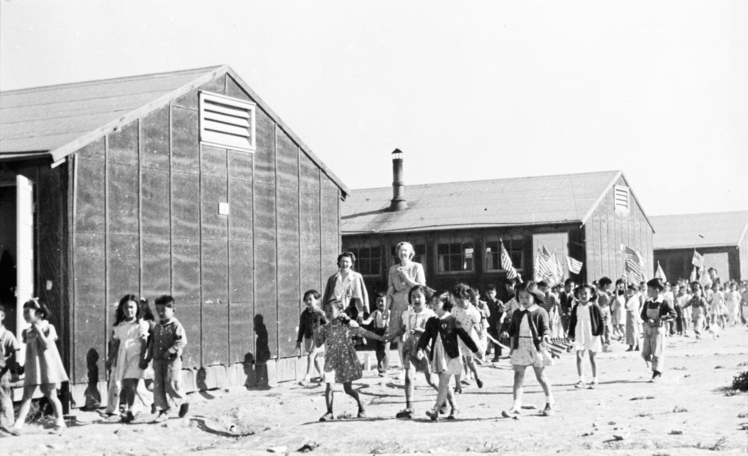About how old do you think you were when you had your first memory? Three-years-old? Four? Try to remember what it was and where you were. Calvin Tanabe’s first memory goes back to sometime in the middle of spring 1942, when he was a three-and-a-half-year-old Oregon boy.
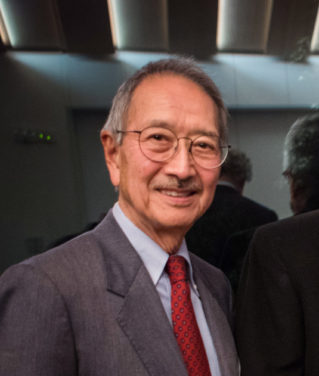
Portland Japanese Garden philanthropist and current Board of Trustees member Calvin Tanabe says while he doesn’t remember the house where he was living with his parents on a little farm in northeast Portland, he does remember being rounded up by the government and having to leave that house.
“I remember a little bit of what the government called the ‘assembly center,’ which was a livestock pavilion. And they put up these canvas partitions, rounded us up and put us all in there.”
Tanabe, now 81, will never forget it. “Cal” Tanabe was born in Portland. His mother, also born in Portland, had moved to Japan but came back after high school. His father came to Oregon from Japan when he was 14 years old. After his parents were married, they moved frequently around Oregon as transient farmers wherever they could find work.
In 1942, the Tanabe farm was located where the Portland airport currently sits. It was small by farm standards, about 20 or 30 acres. They were truck farmers who raised vegetables and drove them into town like most farmers did in those days. Many in that area were Japanese and Italian.
Cal’s parents had recently purchased a 1941 Chevrolet truck, they owned a horse and a tractor. His father drove vegetables around in their new truck, and things were looking up until World War II changed the course of their lives forever.
An Executive Order
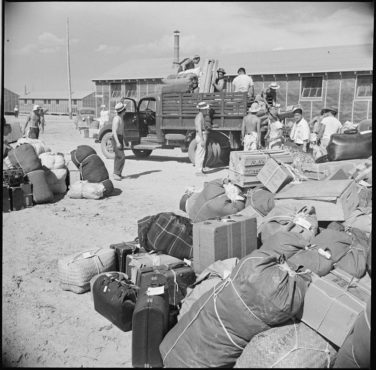
Between 1942 and the end of World War II, in the single-largest forced relocation in U.S. history, nearly 120,000 Japanese Americans were forced from their homes and transported to internment camps across the western United States.
The policy was the direct result of President Franklin D. Roosevelt’s Executive Order designating all West Coast residents of Japanese ancestry — whether citizens or not — as “enemy aliens.”
Family Number 16133
After the Tanabe family was forced to live in Portland’s livestock pavilion, Cal says he remembers a tag being placed on his shirt. The tag had the number 16133.
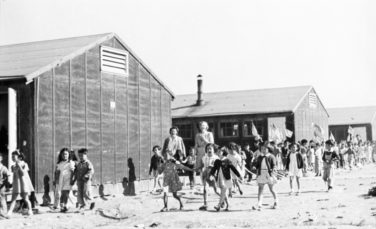
“All the families had numbers. Ours was 16133. I remember they made me wear my family number because I was little and would wander off. That way, someone could help me back, because it was just a maze of partitions, canvas partitions everywhere.”
He and his family lived in the livestock pavilion for three months before they were put on a train to Idaho. To a three-and-a-half-year-old boy, being on a train was exciting, he said. They ended up in Minidoka, Idaho.
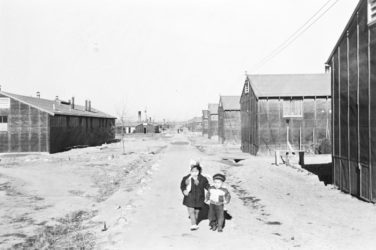
“I don’t know if they told us where we were going or if I was just too small to really know. But that’s where my memory really starts, [it] is in that concentration camp in Idaho.”
Today he says he distinctly remembers everything about it, from walking from the barracks where he stayed to his first-grade school room.
He and his family were interned for three years.
Life After Internment
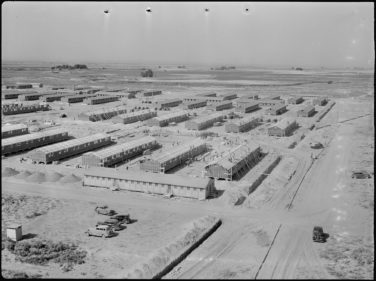
On June 7, 1945, shortly before the war ended – Cal Tanabe’s family was allowed to leave.
But, like many other families, they had nowhere to go. At that time, they couldn’t return to Portland because of what the government called ‘military necessity,’ not allowing them to live anywhere located roughly 150 miles from the Oregon coast.
His mother was “given back” her ironing board and sewing machine, and the family moved to eastern Oregon because relatives who had also been living in the camps bought an orchard in Ontario, Oregon.
“It was a crummy little building for transient workers. That’s where we lived, and so did several other Japanese families.”
While most of the other families went back to Portland as soon as they could, the Tanabe’s stayed and worked on the farm. Cal Tanabe went to high school in Ontario, eventually excelled to the top of all his classes, and later was accepted to medical school. When his father had a stroke during his first year of medical school, Cal started reading about the brain and became fascinated with it. He went on to become a neurosurgeon.
A Student of the Brain
Over the course of his parents’ lives, Cal and his siblings never once had an in-depth conversation with them about the internment. They’d mention it, he said, but not ever with an expression of anger.
“I became a student of the brain so to speak. And, I’ve read a lot about the brain. More and more I appreciate from what I’ve read how important your early years are in your development. I find that it’s the next generation of Japanese Americans—who’ve never experienced internment—who are the most outraged. It doesn’t surprise me in that they didn’t experience the psychological trauma. You know, even though you look healthy like I did, when you grow up in those circumstances, somehow you just learned to shut up.”
“…when you grow up in those circumstances, somehow you just learned to shut up.”
He says the next generation is probably more psychologically healthy than his own from having not experienced life in an internment camp.
Reticent to Speak-up
“I have noticed, and of course there are exceptions, but other people in my age group, they are reticent to speak up in big groups. I don’t know if that fits our circumstances or if it’s part of our culture. But, no one has made a big deal of what was not constitutionally correct.”
When asked if it makes him angry, Cal Tanabe says yes, but he doesn’t let it define him.
He says the “saddest thing of all for him” is that while an apology was issued, it was never ruled unconstitutional to imprison your own citizens without pressing charges.
“They get away with this, the best I can tell, by saying that it was done ‘because of military necessity,’ which means to me that in the future if there’s ‘military necessity,’ they can imprison a group of people again.”
It’s not just the Japanese, he says. All immigrant groups and all people that anyone perceives as being ‘different’ have had similar concerns.
“I think it’s a good example for Americans to think about how fragile a democracy can be and how vigilant you have to be to protect the rights of all of its citizens.”
